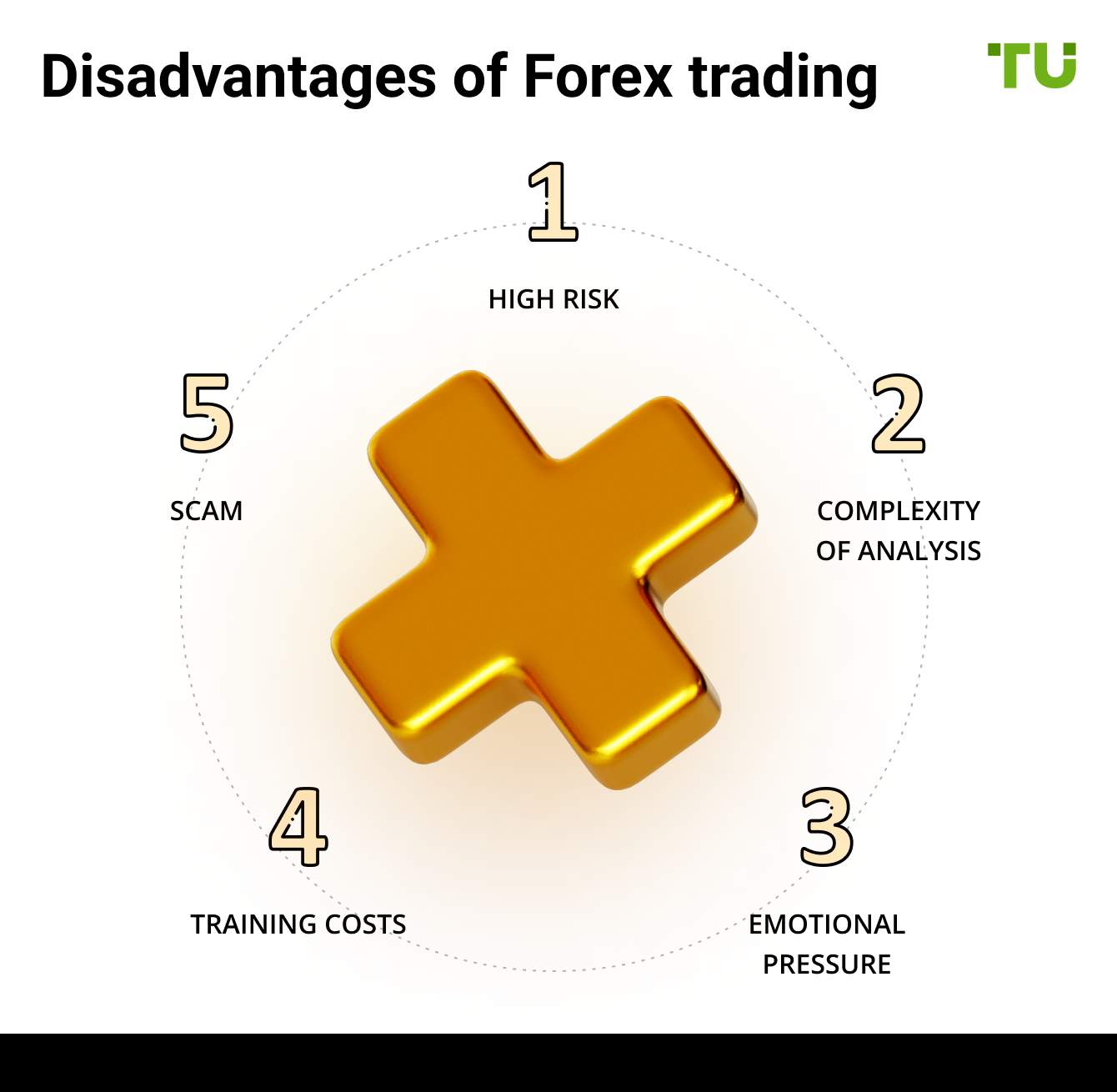Why To Trade Forex | Main Reasons



Editorial Note: While we adhere to strict Editorial Integrity, this post may contain references to products from our partners. Here's an explanation for How We Make Money. None of the data and information on this webpage constitutes investment advice according to our Disclaimer.
Forex trading is popular due to its high liquidity, allowing traders to buy and sell quickly, and its 24-hour market, enabling trading at any time. Additionally, traders can benefit from the ability to profit from both rising and falling markets through long and short positions.
Forex market provides unique opportunities for making money on currency fluctuations and allows you to work with minimal initial costs. But in order to effectively use all the advantages of Forex trading and minimize possible risks, you need to understand certain aspects of trading. Let's figure out why you need to trade on Forex, why we'll look at all the subtleties and nuances.
Why to trade Forex
The Forex market is a global decentralized platform for trading currencies. Merchants here transact more than $7.5 trillion every day. This makes it the largest and most liquid financial market in the world. The main attraction of Forex is its high liquidity and round-the-clock availability, which allows traders from all over the world to actively participate in trading at any time of the day.
The importance of the Forex market is undeniable as it plays a key role in the global economy by ensuring stable exchange rates and facilitating international trade and investment. Thanks to Forex, companies can hedge currency risks, and investors can diversify their portfolios.
Of course, for each individual trader, Forex provides opportunities to increase capital and increase wealth. Therefore, understanding the pros and cons of Forex trading is critical for every trader. The advantages include high liquidity, the ability to make money on price fluctuations, and market accessibility with relatively low initial costs. However, there are a number of significant risks, such as high volatility, complexity of analysis and emotional pressure. Let's look at these advantages and risks of the Forex market in more detail.
Advantages of Forex trading
High liquidity
Forex is the largest financial market in the world with a daily turnover of over $7.5 trillion. This provides mind-blowing liquidity, which translates into ease of transactions at any time of the day or year. Traders can quickly enter and exit positions without significant price changes, reducing risk and improving the trading environment.
24-hour market
Оne of the main advantages of Forex is its 24-hour availability. Trading begins with the Asian session, continues through the European session and ends with the American session. This allows traders from different time zones to actively participate in trading at a time convenient for them. 24/5 operation also allows for real-time response to global economic events, which can be especially important for short-term strategies.
Low start-up costs
Forex provides trading opportunities with relatively low start-up costs. Many brokers offer market access with minimum deposits and low commission fees. Margin trading allows traders to use leverage to increase trading volume, making the market accessible even to beginners with limited capital.
Earning money on volatility
In Forex, traders can make money on both rising and falling prices of currency pairs. This is achieved through the ability to open long (long) and short (short) positions. This flexibility allows you to take advantage of different market conditions to make a profit. For example, when expecting a currency to rise, a trader opens a long position, and when expecting a fall, a trader opens a short position.
Variety of earning options
Forex offers a wide selection of currency pairs and trading instruments, which allows traders to develop and apply a variety of strategies. Major currency pairs such as EUR/USD, GBP/USD and USD/JPY have high liquidity and low spreads, making them popular among traders. Additionally, there are many cross rates and exotic pairs that can offer unique trading opportunities.

High risk
Exchange rates may fluctuate significantly over a short period of time. This is influenced by economic reports, political events and other world news. High volatility means potential (but not obligatory!) losses, especially for those traders who use leverage. Poor risk management and lack of experience can multiply losses, making Forex trading potentially dangerous for those who are not prepared to take such risks.
Complexity of analysis
Successful Forex trading requires an understanding of both technical and fundamental analysis. Technical analysis involves the study of charts and indicators to predict future price movements, while fundamental analysis requires an understanding of economic data, political events, and other factors affecting exchange rates. Mastering these techniques requires significant time and effort, as well as ongoing training to stay abreast of the latest trends and changes in the market.
Emotional pressure
Forex trading can be stressful. Rapid price changes and the need to make snap decisions can put significant emotional pressure on traders. The main emotions in trading are fear and greed. They can influence decision making, leading to errors and losses. You should also not write off irritability, which leads to destructive consequences in Forex trading. Successful trading requires iron discipline and the ability to control emotions, which is not always easy, especially for novice traders.
Training costs
Successful Forex trading requires investing in quality training and trading platforms. Professional courses, books, webinars and other educational resources can be expensive. In addition, many trading platforms and analytical tools also require a financial investment. These costs can be significant, especially for those just starting out in trading.
Scam
The Forex market attracts not only traders, but also scammers. The risk of falling for fraudulent “brokers” is not great, but it exists. These "brokers" manipulate prices, make unauthorized withdrawals, or refuse to withdraw funds to clients' external accounts. Choosing a reliable and regulated broker is critical to protecting your investment. Traders should conduct thorough research and vetting of brokers before entrusting them with their money.
To avoid scammers, we have selected reliable brokers that open the door to the Forex market.
| Plus500 | Pepperstone | OANDA | FOREX.com | Interactive Brokers | |
|---|---|---|---|---|---|
|
Demo |
Yes | Yes | Yes | Yes | Yes |
|
Min. deposit, $ |
100 | No | No | 100 | No |
|
Max. leverage |
1:300 | 1:500 | 1:200 | 1:50 | 1:30 |
|
Min Spread EUR/USD, pips |
0,5 | 0,5 | 0,1 | 0,7 | 0,2 |
|
Max Spread EUR/USD, pips |
0,9 | 1,5 | 0,5 | 1,2 | 0,8 |
|
Regulation |
FCA, CySEC, MAS, ASIC, FMA, FSA (Seychelles) | ASIC, FCA, DFSA, BaFin, CMA, SCB, CySec | FSC (BVI), ASIC, IIROC, FCA, CFTC, NFA | CIMA, FCA, FSA (Japan), NFA, IIROC, ASIC, CFTC | SEC, FINRA, SIPC, FCA, NSE, BSE, SEBI, SEHK, HKFE, IIROC, ASIC, CFTC, NFA |
|
Open account |
Open an account Your capital is at risk. |
Open an account Your capital is at risk.
|
Open an account Your capital is at risk. |
Study review | Open an account Your capital is at risk. |
Never risk more than you are willing to lose
Forex trading is exciting and offers many chances to make money. As an experienced trader, I can say that success requires knowing not only technical and fundamental analysis, but also the right approach to risk management. One of the key points is to never risk more than you are willing to lose. Money management and setting stop losses on each trade will help minimize losses and preserve your investments.
The second important aspect is discipline and emotional stability. Forex can be very volatile and rapid price changes can be stressful. Don't get emotional and stick to your trading plan. Develop a clear strategy and stick to it, no matter how attractive the short-term opportunities may seem. Discipline and self-control are the most important qualities of a successful trader.
Finally, constantly learn and improve your skills. The Forex market is constantly changing, and successful traders are always up to date with the latest trends and news. Attend webinars, read specialized literature and discuss strategies with other traders. Remember that Forex trading is a marathon, not a sprint, and continuous improvement is the key to long-term success.
Conclusion
Forex trading offers a wide range of earning opportunities due to its high liquidity, 24-hour availability, and variety of instruments. However, it also involves high risks, the complexity of analysis, and emotional pressure. Successful trading requires investment in education and careful selection of reliable brokers. Understanding both the pros and cons of Forex trading will help traders make informed decisions and manage risks effectively, which is key to successful and sustainable trading.
FAQs
What initial capital is required to trade Forex?
The standard trading capital can be from 10-100 USD - many brokers allow you to start with small deposits.
What tools can be used to analyze the Forex market?
To analyze the Forex market, you can use technical analysis, fundamental analysis and various trading indicators.
What time frames are most popular among Forex traders?
The most popular time frames among traders are daily and hourly charts.
What are the main factors influencing exchange rate fluctuations?
The main factors are economic indicators, political events and changes in monetary policy.
Related Articles
Team that worked on the article
Chinmay Soni is a financial analyst with more than 5 years of experience in working with stocks, Forex, derivatives, and other assets. As a founder of a boutique research firm and an active researcher, he covers various industries and fields, providing insights backed by statistical data. He is also an educator in the field of finance and technology.
As an author for Traders Union, he contributes his deep analytical insights on various topics, taking into account various aspects.
Olga Shendetskaya has been a part of the Traders Union team as an author, editor and proofreader since 2017. Since 2020, Shendetskaya has been the assistant chief editor of the website of Traders Union, an international association of traders. She has over 10 years of experience of working with economic and financial texts. In the period of 2017-2020, Olga has worked as a journalist and editor of laftNews news agency, economic and financial news sections. At the moment, Olga is a part of the team of top industry experts involved in creation of educational articles in finance and investment, overseeing their writing and publication on the Traders Union website.
Mirjan Hipolito is a journalist and news editor at Traders Union. She is an expert crypto writer with five years of experience in the financial markets. Her specialties are daily market news, price predictions, and Initial Coin Offerings (ICO).
Economic indicators — a tool of fundamental analysis that allows to assess the state of an economic entity or the economy as a whole, as well as to make a forecast. These include: GDP, discount rates, inflation data, unemployment statistics, industrial production data, consumer price indices, etc.
Forex trading, short for foreign exchange trading, is the practice of buying and selling currencies in the global foreign exchange market with the aim of profiting from fluctuations in exchange rates. Traders speculate on whether one currency will rise or fall in value relative to another currency and make trading decisions accordingly. However, beware that trading carries risks, and you can lose your whole capital.
Diversification is an investment strategy that involves spreading investments across different asset classes, industries, and geographic regions to reduce overall risk.
Cryptocurrency is a type of digital or virtual currency that relies on cryptography for security. Unlike traditional currencies issued by governments (fiat currencies), cryptocurrencies operate on decentralized networks, typically based on blockchain technology.
An investor is an individual, who invests money in an asset with the expectation that its value would appreciate in the future. The asset can be anything, including a bond, debenture, mutual fund, equity, gold, silver, exchange-traded funds (ETFs), and real-estate property.






























































































































